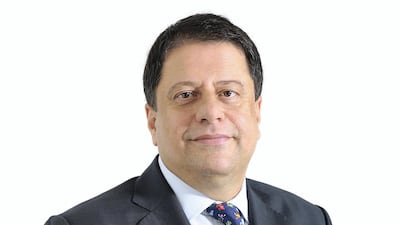Jet lessor Dubai Aerospace Enterprise (DAE) may tap the Islamic bond market for the first time as it looks to raise $1.5 billion (Dh5.5bn) in unsecured debt this year to fund fleet expansion.
The company will use the funds to buy $2bn worth of aircraft through sale-and-leaseback deals and purchases on the secondary market, Firoz Tarapore, DAE's chief executive, told The National.
"It's a little ironic that we're Dubai Aerospace, based in Dubai, and we don't have Islamic financing in our arsenal," Mr Tarapore said in an interview. "Now that we have solid investment-grade ratings, the timing is right for us to come to market."
In January, Moody's Investor's Service upgraded DAE's corporate family rating to 'Baa3', an investment-grade rating, reflecting the company's improved funding structure and liquidity. In July 2019, the company received an initial investment-grade rating from Fitch. The upgrades means access to a larger pool of liquidity, DAE said.
DAE, which previously issued conventional bonds, is mulling a $500 million sukuk sale in the "near term", as the company looks to tap global demand for Shariah-compliant financing in Asia, the Middle East and parts of Europe, Mr Tarapore said.
DAE plans to double its portfolio to 800 jets within six to eight years but has no immediate plans to place an order with aircraft manufacturers because of the "disconnect" between order prices and delivery schedules versus the rate available in the rental market, Mr Tarapore said.
The company has dropped plans to acquire other plane-lessor rivals as it sees no attractive targets currently in the market.
"If you look at what’s available for sale now, there really isn’t anything that would naturally fall in our sweet spot," Mr Tarapore said. "Inorganic growth is always an option for us but there are no large entities that are available."
The firm is instead exploring other channels to grow its portfolio such as sale-and-leaseback deals or purchases on the secondary market.
"Our expectation is that this year we’d be booking $1.5bn to $2bn of headline asset growth from these non-OEM origination channels, this looks quite promising at the moment," he said. "If our competitors' hands are somewhat tied up in mispriced OEM orders, this allows us to flex our relevance in other channels."
DAE, whose takeover of Dublin-based lessor AWAS in 2017 propelled it into the top ranks of global aircraft lessors, is bullish about 2020 as industry fundamentals remain solid. However, it sees headwinds from the spread of the deadly coronavirus that has crimped air travel demand as well as the continued grounding of the Boeing 737 Max and trade tensions.
"The outlook for us is very strong because ... the underlying industry continues to be very strong. I say that knowing that there are clouds on the horizon which will have near-term impact," Mr Tarapore said. "Nonetheless, the fundamental trend is still a positive one and we expect to fight our corner in a positive way."
Some Chinese airlines are asking for deferrals on payments for aircraft rentals as they grapple with lower demand due to the coronavirus, which originated in China, and DAE is assessing these requests on a case-by-case basis depending on merit.
"We are seeing initial approaches from those who are most impacted, which are the Chinese airlines, because demand is significantly off, people can’t work in their offices, it’s hard to run an airline and we have to be sympathetic," he said. "We’ll review that and to the extent we can be helpful, we will."
DAE serves 112 airline customers worldwide and China comprises about seven per cent of the company's business.
"We fully expect these airlines will come, not just to us, but to the lessor community to seek cash-flow rental relief," he said. "The first thing we’d look at is the broader development of coronavirus: is it peaking and are there solutions in sight?"
On the grounding of 737 Max for nearly a year, Mr Tarapore said Boeing "needs to do more work" to restore customers' trust in the aircraft.
"We hope Boeing has robust plans to address this," he said. "Assuming that customer trust will automatically follow regulatory approval is not the right approach."
Once it flies, the Max will be "the most scrutinised" jet in service and will resume its position in the market, he said.
DAE is seeing "super high" demand for the older 737 Next-Generation model since the Max grounding as operators grapple with the loss in capacity.
"Demand for the 737NG aircraft is incredible, industry-wide," he said.
The demand spike did not significantly contribute to DAE's bottom line as the "market is firm but there’s no silly pricing going on," he said.


